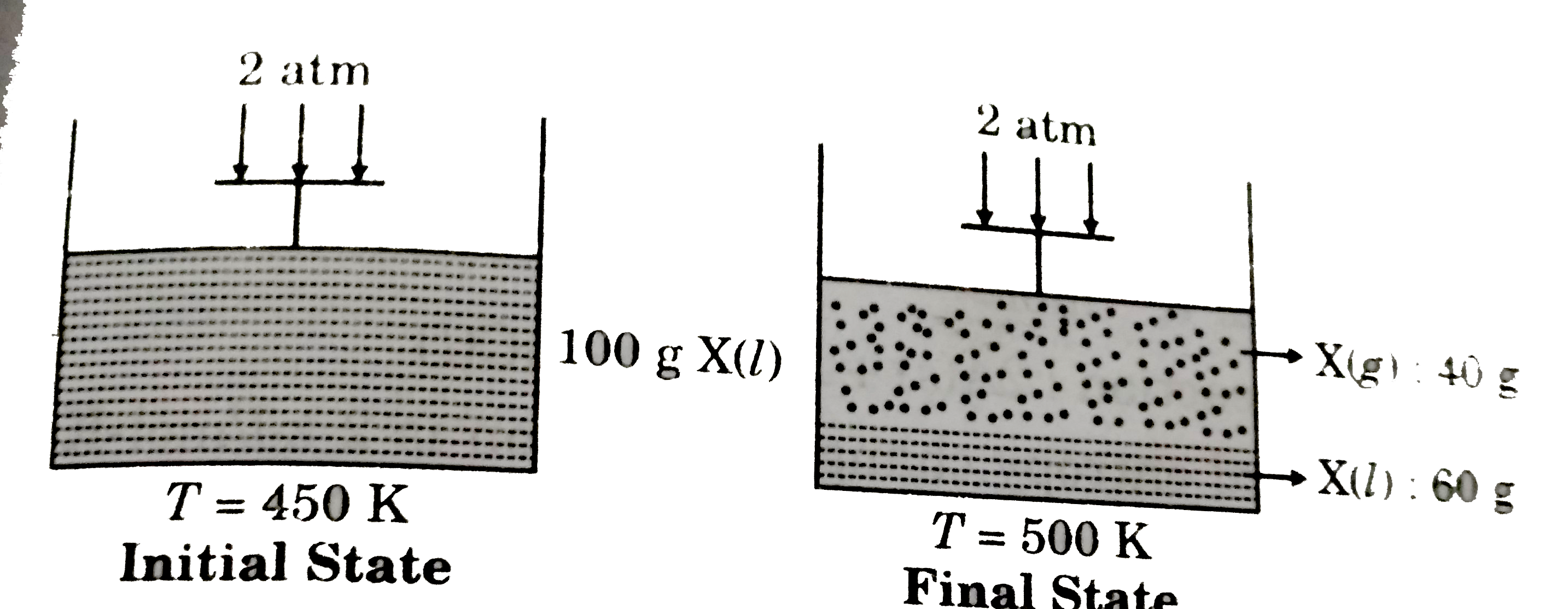Combustion of sucrose is used by aerobic organisms for providing energy for the life sustaining process. If all the capturing of energy from the reaction is done through electrical process (non P-V work), then calculate, maximum available energy which can be captured by combustion of 34.2 g of sucrose :
(Given : ΔHcombustion(sucrose)=−6000kJmol−1
ΔScombustion=180j/K−mol and bodyntemperature is 300 K)
600 kJ
594.6 kJ
5.4 kJ
605.4 kJ
The correct Answer is:D
Sucrose (molecular weight) = 342
From ΔG=ΔH−TΔS=−6000×103−300×180=−6504×103kJ/mol
For 34.2 gm energy available =6054342×34.2=605.4 kJ
Similar Questions
Calculate the standard free energy change for the combustion of glucose at 298K, using the given data,
C6H12O6+6O2→6CO2+6H2O
ΔH∘=−2820kJ mol−1,ΔS∘=210JK−1 mol−1
View SolutionIt is obseved that functioning of neuronal circuits in our brain is driven by the energy available from combustion of glucose. Calculate the amount of glucose (in gm) which should be burnt per hour to produce sufficient energy for brain which operated at1289 watts.
|ΔH∘| 400 K combustion of glucose = 3000 kJ/mole
[Geven : |ΔS∘| 400 K combustion of glucose = 180 J/mol K]
View Solution
Knowledge Check
Combustion of sucrose is used by aerobic oranisms for providing energy for the life sustaining processes. If all the capturing of energy from reaction is done through electrical process (non P−V work), then calculate maximum available energy which can be captured by combustion of 34.2g of sucrose.
Given, ΔHcombustion(surrose)=−6000KJmol−1
ΔScombustion=180J/K−mol and body temperatuire is 300KA600KJB594.6KJC5.4KJD605.4KJIn order to solve a complex physical chemistry, problem, brain requires some "netural energives " which are electical in nature. Each problem on an average requires 21 Joules of netral energy. Calculate minimum amount of glucose required to solve 10 such problem if all electrical energy is obtained for oxidation of glucose:
[Given:δH∘combustionof glucose=−2800k/Jmole
δS∘combustionof glucose=−10003J/mol/K, Temperature=300K]A14gB14mgC20gD120mgThe combustion of 1.22 g benzoic acid (M=122) in a bomb calorimeter at 300 K caused a temperature rise of 3 K, While combustion of 0.88 g ethyl ethanote (M=88) caused a temperature rise of 2 K. Calculate the enthalapy change of combustion of CH3COOC2H5(l) at 300 K. Given : Internal energy change of combustion for benzoic acid =-300kJmol−1 at 300 K and R=8.3JK−1mol−1
A−2000kJ/molB−2002.49kJ/molC−2006.5kJ/molD−3002.5kJ/mol
Animals operate under conditions of constant pressure and most of the processes that maintain life are electrical (in a broad sense). How much energy is available for sustaining this type of muscular and nervous activity from the combustion of 1 mol of glucose molecules under standard conditions at 37∘C (blood temperature)? The entropy change is +182.4JK−1 for the reaction as stated.
ΔHcombustion[glucose]=−2808KJ
View SolutionA person takes 15 breaths per minute. The volume of air inhaled in each breath is 448 ml and contains 21% of oxygen by volume. The exhaled air contains 16% of oxygen by volume. If all the oxygen is used in the combustion of sucrose, how much of the Sucrose is burnt in the body per day & how much heat is evolved. ΔHcom of sucrose is =6000kJmol−1. Take temperature to be 300 K throughout. [Assuming Vinhaled air=Vexhalded air,Patm=1atm]
View Solution1g of coal on complete combustion liberates 18kJ of heat. Calculate the amount of coal required to liberate the same amount of heat that an electric heater of 2kW provides in 1h.
or
Electricity generated by a windmill is another form of solar energy. Explain ?
View SolutionThe external pressure 2 atm is applied on frictionless movable piston, fitted in a vessel containing 100 g of X(g) at 450 K. now heat is sulplied keeping pressure constant till 40 g of Xis evaporated to to from X(g) at 500 K (boinling poing ). Calculate change in internal (ΔU) energy in kJ for overall process. Assume vapour of X (l) behaves like an ideal gas.

Given : Molar hect capacity of X (l) =60 J/mol K: ΔHvaporisation=30kJ/mol,ΔHvaporisation=30kJ/mol,R=8.3J/mol-K
At weight of X = 20g/mol.
View SolutionFor an internal combustion engine to move a vehicle down the road ,it must convert the energy stored in the fuel into mechanical energy to drive the wheels. In your car, the distributor and battery provide this starting energy by creating an electrical "spark", which helps in combustion of fuels like gasoline. Below is the reaction depicting complete combustion of gasoline in full supply of air:
2C8H18(l)+25O2(g)→16'x'
On the basis of evolution/absorption of energy, which of the following processes are similar to combustion of fuel?
(a) Photosynthesis in plants
(b)Respiration in the human body
(c ) Decomposition of vegetable matter
(d) Decomposition of ferrous sulphate .
View Solution
